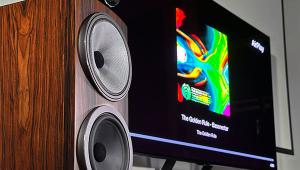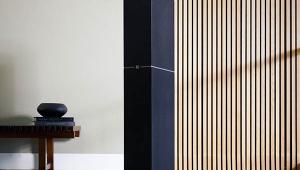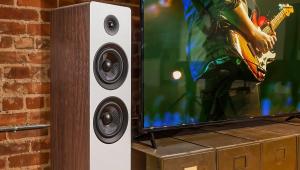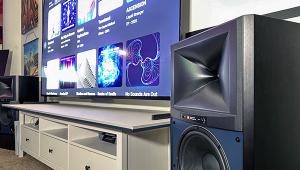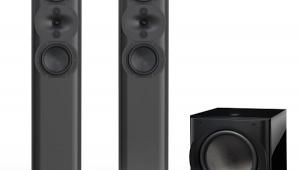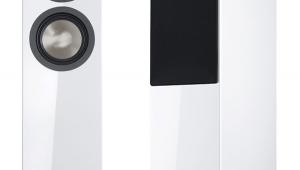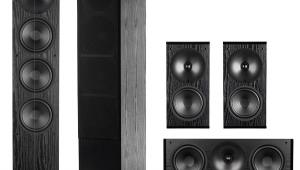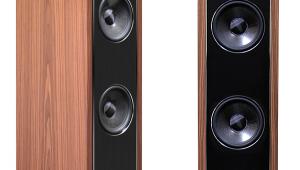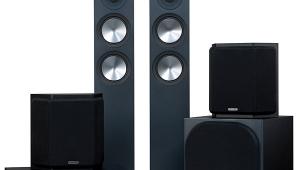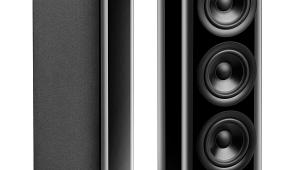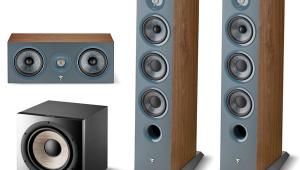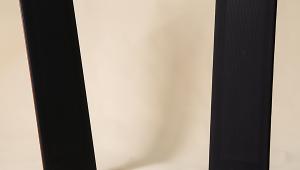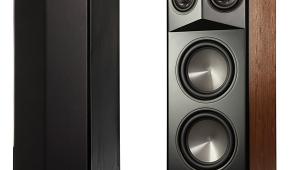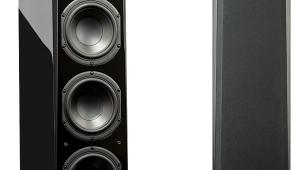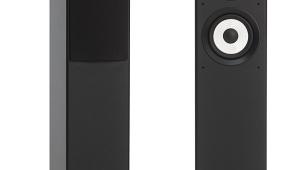Tannoy Arena Highline 500 Speaker System and Marantz SR8001 A/V Receiver
I drink green tea the way some people drink water. I make it in large batches, keep it in the fridge, and guzzle it all day. Such are the dimensions of this innocuous drug habit that I blend teas, often adding a pinch of Butterfly Sencha (with peach and sunflower petals) to a standard Sencha, creating something more subtle than the former and more interesting than the latter. (The Tea Squad may burst through the door to arrest me at any moment.) I do the same with surround equipment. This month, I've deliberately brought together a receiver brand that prides itself on neutrality with a speaker brand that obsesses about the purity and phase coherence of high frequencies. Marantz, meet Tannoy. Tannoy, meet Marantz. What will happen next?

Higher Than High
As the Arena Highline 500 speaker system demonstrates, Tannoy has done a lot of thinking about the tweeter. Like KEF, another icon of British loudspeaker design, Tannoy believes that the best position for a tweeter is in the center of a midrange/low-frequency driver. That way, the two drivers can approximate a point source—that is, a wide range of frequencies leap out of the speaker from the same position, arriving at the ear at the same time, even when the listener is off axis. Tannoy calls this a Dual Concentric array. (The generic term is coaxial.)
Another of Tannoy's departures from the norm is their tweeter's frequency range. Most speakers extend up to about 20 kilohertz, a bit beyond the range of most human hearing. Many speakers are rated up to 25 kHz. However, Tannoy prides themselves on extending the high-frequency response of their WideBand tweeter to 54 kHz.
True, your ears will not hear that additional octave or so directly (unless you're a small, furry animal). Even so, Tannoy contends, this kind of high-frequency extension corrects time and phase response in ways that affect audible highs, ensuring that the highs your ears can hear are more coherent.
As I was breaking in the speakers, I casually put on an ancient harpsichord recording of Bach's Well-Tempered Clavier by the legendary Wanda Landowska. This old set of LPs had been gathering dust since a much younger version of me bought it long ago. The early-1950s mono recording had always seemed dull and distant, standing between the historic performance and me.
Hearing it through the Tannoys was like watching someone suddenly leap out of a framed sepia-tinted picture. The plucking of the harpsichord strings seemed like a vibrant physical phenomenon right there in the room with me. Around the notes, there was air and space. I was getting the feel, if not the precise sonic characteristics, of surround sound from two speakers reproducing a monaural recording. Let it suffice to say that the Tannoy Arena Highline 500 system had gotten my attention.
Chosen Few
I can count the number of receiver brands I privately recommend to friends and readers on the fingers of one hand and still have a few fingers left. Marantz makes the "A" list. In addition to a reliably neutral and ungimmicky midrange, the company also consistently delivers a solid features set. The SR8001 A/V receiver is second from the top of Marantz's line and is therefore well equipped to take on the challenges of higher-end home theater.
Despite a rack-friendly reduction in depth to less than 16 inches, the copper-plated chassis still houses a large toroidal power transformer. Power is rated at 125 watts times seven. Marantz prides themselves on delivering at least 75 percent of the rated power into five channels simultaneously driven. The HT Labs measurements box will tell you if they succeeded. The receiver is THX Select2 certified and therefore was proven to fill a 2,000-cubic-foot room with loud, clean sound, when used with THX Select2–certified speakers, even before the first production unit hit the shelves.
Worried about HDMI connectivity? The SR8001 has four inputs and two outputs. It supports HDMI version 1.2, which handles all of the major surround codecs old and new, except for Dolby TrueHD and DTS-HD Master Audio. Those require HDMI 1.3 as far as a digital connection goes, although this receiver can support them via the 7.1-channel analog input. The main difference of interest to me between HDMI 1.1 and HDMI 1.2 is that the newer one is SACD friendly. You can output video signals entering through the analog inputs (component, S-video, and composite video) at 1080p with time-base correction.
If your room or speakers have acoustic problems—or you just want to make life easier—the receiver's Audyssey MultEQ system might help. It uses a microphone plugged into the front panel to sense the type of speakers you're using and their distance from the listening position, and it handles the necessary settings. It also tailors each speaker's frequency response in one of four modes: Audyssey (or "Audyssey knows best," as I call it), Front (all speakers matched to the fronts), Flat (all speakers flat), or Preset (manual EQ settings). I needed a stable frame of reference for this review, and I'd tried Audyssey before, so I didn't use it much this time around. It might benefit a system living in an acoustically problematic room, though, especially in terms of bass response.
Gloss and Glamour
My Tannoy Arena Highline 500 review system consisted of two towers and three satellites that I used for the center and surrounds. All are sleek extruded-aluminum tubes with an attractive gloss finish. The tower bases are rather small relative to the speakers' height, so you'd be well advised to use the supplied spikes, if only to more safely anchor the speakers to the floor. Optional stands for the smaller speakers come fully assembled. You only need to affix the satellites with lock washers and screws. Tannoy also includes wall-mount brackets.
A titanium dome tweeter is at the heart of Tannoy's Dual Concentric array. The tweeter sits in the center of a 4-inch paper cone midrange, and another 4-inch driver serves as an additional woofer (in both the tower and the satellite). The grilles are nondetachable.
Because the speakers have relatively little bass extension due to their small drivers and slender enclosures, I got the best results when I used a subwoofer cross-over of at least 120 hertz. That means you'll have to place the sub fairly close to the center speaker to keep the lower registers of voices from detaching. Fortunately, the sub is a marvel. It is narrow relative to its height and depth, so it doesn't bulk large in the room. But it packs a 12-inch driver in its glossy enclosure.
The sub's controls—found on top, which is worth a commendation in and of itself—include a bypass switch and a continuously adjustable phase control, in addition to the usual volume, crossover, and power controls. One unusual item among the gleaming top-panel knobs is a continuously adjustable Movie/Music control that trades off low-frequency extension for maximum output level. Music mode plays lower, while Movie mode plays louder. The manual recommends that you set it in the middle if you don't want to fuss with it.
The Marantz receiver gave the Tannoys the plentiful supply of clean power they demanded. Be forewarned: If you feed these speakers with a cheap receiver, they may punish you for it. But, give them an abundant supply of clean watts, and you'll learn things you'd never known before. For example, I never thought I could sit still for hours and listen to a harpsichord recorded in mono.
 Lay Bare Every Effect
Lay Bare Every Effect
Movie soundtracks are a woven hodgepodge of natural and fake sound—plus music, of course. Speaker systems blend these elements either crudely or artfully. The Highlines broke from the pack and precisely rendered every sound and laid bare every panning effect, revealing the inherent artificiality of even the best soundtracks. As advertised, the speakers also imaged beautifully. Their Dual Concentric drivers easily pinpointed every sound in space, both side to side and front to back. At first, I was taken aback; I found the overall impact to be somewhat clinical compared with what I'm used to. But it didn't take me long to adjust to the new flow of incoming information—and start to love it.
Take The Black Dahlia, for instance. This grisly noir-ish Brian De Palma suspenser has one of the most action-packed soundtracks I've ever heard. I filled three pages of my notebook with details about a street riot, a boxing match, numerous blows and clubbings, gunshots, an earthquake, a shattering vase, and a falling chandelier. Still, I never quite shook free of the sound engineer's presence, as his work was schematically laid out and annotated in every sonic detail.
Dialogue was as good as I've ever heard. Every actor became a master enunciator. And Mark Isham's music was impressively varied, from the moody solo trumpet, to k.d. lang's cameo appearance, to the amazing moment—during a movie-within-the-movie scene—when a string orchestra blossoms from mock-movie-house mono to full-frequency surround. The matched coaxial drivers made this moment so pleasurable, I had to stop the disc to replay it.
Crank is a hyperaggressive action flick with a simple premise: Our hero (Jason Stratham) has been injected with a drug that compels him to keep up a constant flow of adrenaline—or else he dies. This sets off relentless mayhem with the jerky visual style of a sped-up video. With panning effects racing around the channels, I finished this 87-minute concerto of violence feeling like I'd just drunk three cups of espresso. The cowriters and codirectors are Mark Neveldine and Brian Taylor. Remember those names.
Despite its rather insistent orchestral soundtrack, All the King's Men was more memorable for the power of Sean Penn's oratory—delivered with all of its masterful dynamics intact—and the spacious rendering of crowd noise. The Dual Concentric drivers and eloquent sub had three different train shots to excel with: one crossing the screen from left to right, one zooming from front to back, and a conversational scene underpinned by the low rumble of a train in motion, which created a relaxing, rocking sensation.
Whither the Center?
Activity in the center channel is a good—and all too rare—thing in SACD surround mixes. That's just one of the things that went right on Ann Hampton Callaway's Blues in the Night (Telarc). Her silky voice fuses blues and jazz in a mix of American songbook classics and original tunes. The singer, pianist, string bassist, and drummer stuck close to the front channels, and the surrounds provided mainly ambience. The Tannoys organized the mids and highs to a fare-thee-well, turning Callaway's inherent warmth into a solid physical presence. Her sister Liz joined the inspired juxtaposition of "Stormy Weather" and "When the Sun Comes Out."
A different approach to the center was apparent on the SACD release of Al Di Meola's Consequence of Chaos. Although the center channel was not entirely silent, Di Meola's skittering guitar resided mostly in the front left and right, with some ambience leaking into the surrounds. This placed him a couple of feet forward of the front speakers. Untethered from the center channel, he might have weaved from side to side as I moved my head were it not for the extremely tight imaging of Tannoy's Dual Concentric tweeter and midrange. This left me free to concentrate on the guitarist's rapid runs and his dizzying unison playing with the piano.
Hail to the Thief was full of the dazzling moves and unsettling beauty I've come to expect from Radiohead. The emotional high point might be "I Will," in which Thom Yorke's voice is a multitracked chorus as he sings a lament backed only by one electric guitar. What could have been an undifferentiated wash of vocal color instead came through as several distinct Thoms. Out-of-phase elements triggered fascinating effects in the surround channels, thanks to the Dolby Pro Logic II Music mode.
Six months before his death, Leonard Bernstein recorded Mozart's unfinished Great Mass in C Minor with the Bavarian Radio Symphony Orchestra. The DVD comes with DTS 5.1 and PCM stereo soundtracks (but, in an odd departure, no Dolby). In a trenchant spoken introduction, made shortly after the Berlin Wall came down, Bernstein boldly interpreted the work as a memorial to the victims of war. That made the hushed "Ave Verum Corpus" quietly devastating. With the Tannoy tweeters' extended treble and effortless low-level resolution, I could almost sense dust motes in the airy ambience of the cathedral.
Normally, it doesn't bother me much to shovel review gear in and out of my system. But I felt some separation anxiety when the end drew near for the Tannoy Arena Highline 500 and Marantz SR8001. The last weekend they were around, I drank an entire bottle of Riesling, gorged on favorite piano recordings, and played every sad song I could think of. Living without that perfect image focus and spatial virtuosity won't be easy.
* Audio editor Mark Fleischmann is also the author of the annually updated book Practical Home Theater (www.quietriverpress.com).
Highlights
Tannoy Arena Highline 500 Speaker System:
• Prominent, delightfully airy high-frequency response
• Slim and alluring form factor
• Eloquent sub
- Log in or register to post comments

